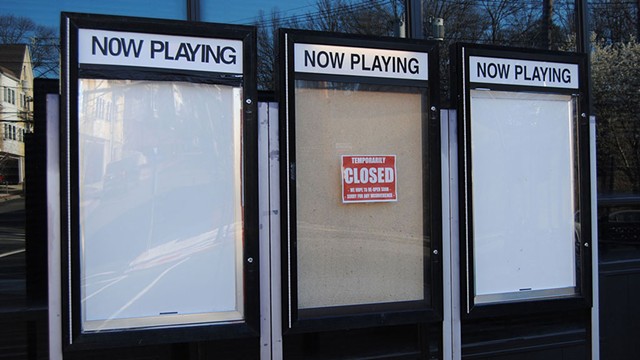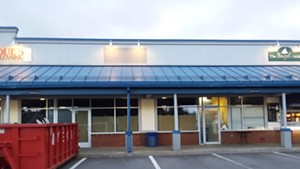
- Courtesy Of Erin Alexis Randolph
For months it's been apparent that the pandemic will have a huge financial impact on Vermont's arts and culture landscape; most organizations have shut their doors and canceled in-person events and exhibitions for the foreseeable future. But the scale of that devastation has been difficult to estimate — until May 7, when the Vermont Arts Council and Vermont Humanities reported on the 130-plus museums, performing arts venues, libraries and other cultural centers that have applied for support from the state's COVID-19 Cultural Relief Grant Program.
In their applications, those organizations are projecting at least $26.7 million in losses through the end of the year.
The VAC and Vermont Humanities are jointly tasked with administering funding from the National Endowment for the Humanities and the National Endowment for the Arts allocated through the federal Coronavirus Aid, Relief and Economic Security Act. Vermont's portion of that money is about $700,000 — about 3 percent of what will likely be lost. While all grantees said they were grateful for the help and the speed with which the grants were distributed, the money — between $5,000 and $10,000 per organization — likely won't go far.
"I can say with confidence, as the chair of the Vermont Creative Network, unless there's a significant step up from philanthropy and the public sector, that you're going to see lots of your community arts organizations struggle to get through this," said Jody Fried, executive director of Catamount Arts in St. Johnsbury.
Catamount Arts doesn't have an endowment or a large cash reserve, Fried said. In fact, the organization is carrying a mortgage from the renovation of the historic building it occupies. When Catamount Arts closed its doors in March, it laid off 12 of its 18 employees. Fried said he's applied for 13 grants so far on behalf of the organization and received two, including money from the Cultural Relief program.
"It's important, and I'm thankful that we received it, but we have a long way to go," he said. "There are very few options to deal with the financial reality."
Of the $2.2 trillion stimulus package passed by Congress in late March, $150 million was allotted to the arts and humanities. The NEH reports that, nationwide, the creative sector generates $878 billion annually. In Vermont, that sector accounts for 9 percent of all jobs, according to the arts council.
The Cultural Relief grants are unrestricted general operating grants available to nonprofits based on their size. The application will remain open until May 31. The program doesn't help for-profit businesses, including many galleries and venues such as Vermont Comedy Club in Burlington.
"It's hard. Not going to lie about that," said Natalie Miller, who co-owns VCC with her husband, Nathan Hartswick. Miller has found that many grant programs, not just the Cultural Relief grants, support only nonprofits.
"We are an art-focused business," she said. "It would be one thing if we were profiting a million dollars a year. But we're struggling, because we don't have the reserve of a Live Nation or one of those giant [events companies]. It's frustrating, though I understand why those parameters were set up."
VCC received a Paycheck Protection Program loan from the Small Business Association, though Miller said she isn't sure the venue will meet the requirements to have the entire loan forgiven. She and Hartswick are also applying for a loan through the Economic Injury Disaster Loan program.
"We opened less than five years ago, and we renovated an entire space, so we still have plenty of debt associated with that," Miller said. "I don't love the idea of taking on more debt. But this is our livelihood, and we really feel like we're important to the community."
She and Hartswick have received individual artist grants because, in normal times, their entire income derives from the club. Along with many of their usual performers, they've been offering live comedy shows four days a week online and are working to find ways to monetize their virtual offerings.
The comedians are unfazed by not having a physical space, however; they presented comedy shows for years in venues around Burlington before settling into their permanent home on Main Street. But the overhead costs on that building are significant, and Hartswick said they're in talks with their landlord, Redstone, "to figure out if there's a way we can move forward together."
"As improvisers, we're trying to see an opportunity in this," Miller said. "We didn't have a home before. We feel really confident that Vermont Comedy Club will return, in one form or another."
For some performing arts groups, the decision to hold on to a physical space will need to be made soon. Laura Roald, the volunteer board president of Off Center for the Dramatic Arts in Burlington, posted a survey on the nonprofit's website asking performers whether they'd be interested in using Off Center's black-box theater (which occupies a rented space in Burlington) in coming months and would be able to pay for it. The other option, she said, would be to "mothball" the organization's equipment, wait out the pandemic and return in a new space when gatherings are permitted again.
"The real problem is the uncertainty," Roald said. "We just don't know what's coming. The things we don't know are what are terrifying and frustrating."
With no paid staff, Off Center has always been in "survival mode," Roald said — but that allows some flexibility. Even if the group needs to temporarily pack up its belongings, such as lighting equipment and seating, no one will lose a job. And if it can manage to stay open, Off Center can run efficiently on about $1,600 a month, Roald said, adding that rent relief from the building's landlord would help significantly.
"This [space] is the resource that we have struggled to put together, and we have worked very hard to put together. And it's not nothing," Roald said. "But how is it useful? What are the artists who work in the performing arts and the dramatic arts going to need in the next year or so?"
A Cultural Relief grant has bought the Off Center a few months, but decisions about the future will have to be made when that money runs out.
In Woodstock, executive director Alita Wilson has laid out three potential budget scenarios for Pentangle Arts, the town's largest public space, housing a movie theater and community arts center. One scenario involves laying off herself, Pentangle's only full-time employee.
About a quarter of the center's budget comes from the town, and Wilson will be able to access that money in July. But she's a little worried about the future of those funds.
"That money, if we were to go completely dark, would help us get through," she said. "My fear, with the town being completely strapped, is what happens next year, next town meeting?"
Wilson isn't currently fundraising for private donations. She doesn't feel like it's the right time, as many potential donors are focused on immediate relief for people who are suffering.
The money for philanthropy isn't necessarily there anyway. Fried, at Catamount Arts, spends a lot of time talking to donors; due to the stock market and businesses changing their operations, he said, people generally have less to give right now.
Fried spoke to the importance of small arts organizations to Vermont's rural economy. Vermonters who attend a show in a small town typically spend an additional $25, on average, at local businesses, he said. For out-of-state visitors, that number doubles.
"This is the long-term vitality of our rural communities, and very much at the heart of that are your local arts organizations and cultural institutions," Fried said. "If there's an existential threat to this sector, the ripple effects of that, economically, are huge."
Correction, May 20, 2020: A previous version of this story misstated a quote from Jody Fried. Fried said community arts organizations will need to see a step up from philanthropy and the public sector.













Comments
Comments are closed.
From 2014-2020, Seven Days allowed readers to comment on all stories posted on our website. While we've appreciated the suggestions and insights, right now Seven Days is prioritizing our core mission — producing high-quality, responsible local journalism — over moderating online debates between readers.
To criticize, correct or praise our reporting, please send us a letter to the editor or send us a tip. We’ll check it out and report the results.
Online comments may return when we have better tech tools for managing them. Thanks for reading.